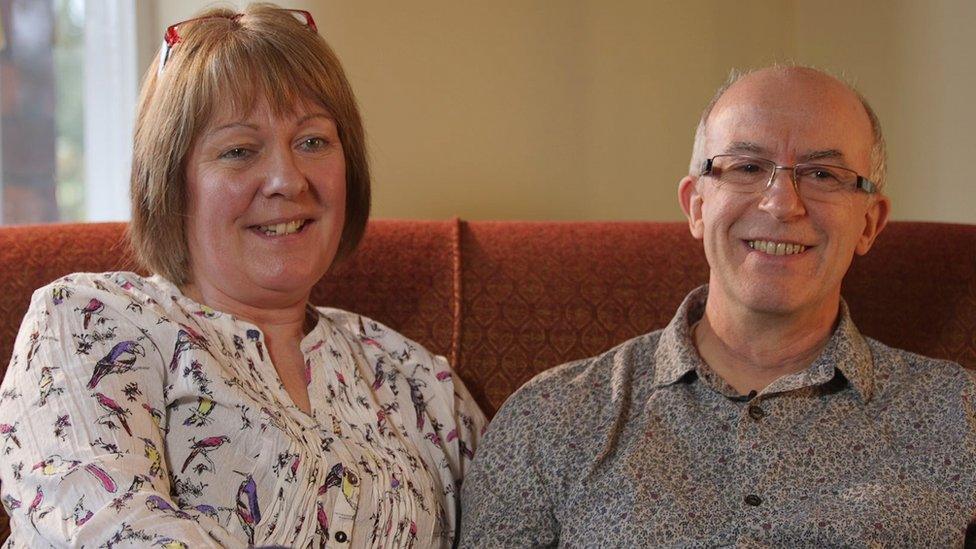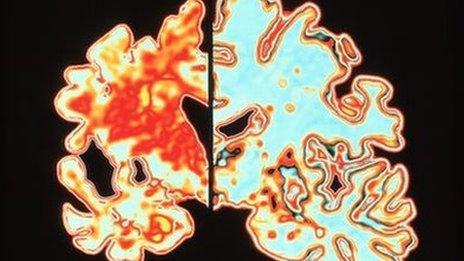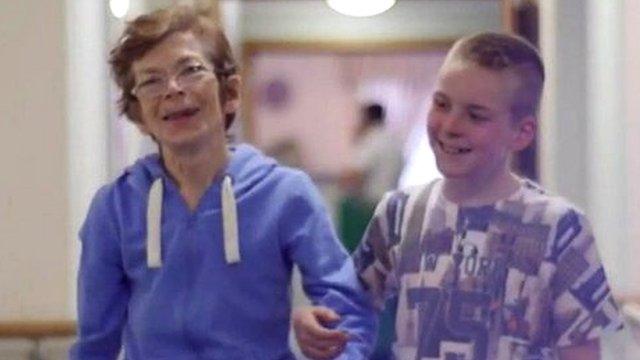'I do my crying in the shower'
- Published

Alison is a full-time carer for her husband, Paul
Caring for a husband with dementia is a lonely and isolating experience, Alison Bulmer says.
"People say I am strong, but I don't feel strong a lot of the time. The shower gets a lot of my tears."
Her husband, Paul, 57, and from Cheshire, has a rare form of Alzheimer's disease that attacks the back of the brain.
This makes it hard for him to read, watch TV or drive, as well as wash, dress or lead an independent life.
He was diagnosed with Posterior Cortical Atrophy (PCA) in his early 50s, which came as a massive shock to his family - Alison and their two adult daughters.
"For him, it was a relief to get a diagnosis," Alison says. "But for us it was devastating.
"Paul was a keen runner, he loved to read and he had a successful career. All of that has been taken away."
Alison has given up work as a teacher to be a full-time carer for Paul. She says she had no other real choice.
"I hate the term 'carer'," she says. "I'm Paul's wife. But, increasingly, I find being a carer is much more at the fore now.
"I can't leave him on his own for more than an hour at a time.
"If it's dark, he can't find the light switch. He can't operate the TV. He will listen to audio books, but he struggles to follow the plot if it's complicated.
"I help him wash, dress and use the toilet.
"We used to be able to go out for meals with friends, but he doesn't like to do that now.
"He's embarrassed because I have to help him with his food.
'Little world'
"And he gets very frustrated. It's the little things, like tying his shoelaces. He is very aware of his deterioration.
"It's incredibly hard seeing such a vital mind disappearing. He's shrinking into this little world."
Alison says she feels like her life is shrinking too.
"It's isolating in terms of not being able to see my friends and the choices I have to make about what is and is not feasible for Paul and I to do," she says.
"But it's also isolating and lonely within the marriage.
"I've known Paul since I was 16. He's the person in the world who knows me best. We used to talk about everything. Now I have to make all of the big decisions."
Alison says even happy occasions are now bittersweet.
"Our eldest daughter is getting married next year. She wanted to get married quickly, so her father could give her away.
"But she will be walking him down the aisle now because my husband - a man who's run half marathons - is unsteady [on his feet].
"It's not the life we expected or hoped to have. You just don't know what's round the corner."
Alison may feel alone, but there are about 850,000 people in the UK living with dementia and 700,000 friends and family caring for a person with the condition, according to Alzheimer's Research UK.
A new report by the charity, called Dementia in the Family, external, highlights some of the difficulties carers can face.
Carers UK says 83% of carers have felt lonely or socially isolated as a result of their caring responsibilities.
If you are looking after an ill, disabled relative or friend, you should recognise yourself as a carer - they can get a range of support from social care, and can be vital for helping arrange social care support for the person they look after.
If you want to talk to someone about how to get support, call the Carers Direct helpline on 0300 123 1053.
- Published11 December 2013

- Published24 November 2015
